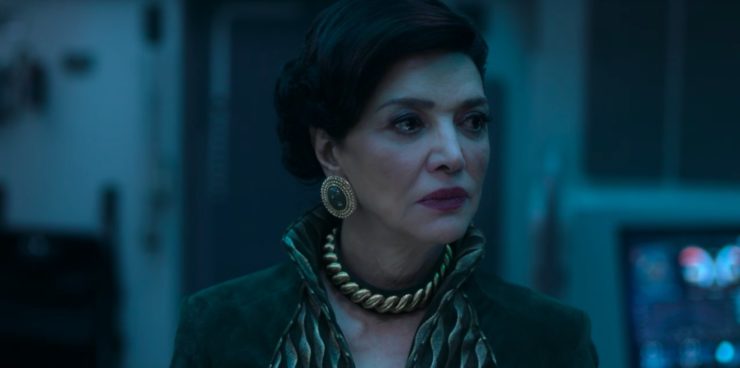A year ago, writing about “Winnipesaukee,” I said, “I love a show that can tell you one of its thesis statements without making it feel like a grand proclamation.”
And now, for the last penultimate episode of the series, they’ve gone and done just that. Again. A few times.
But for all that “Why We Fight” puts its heart on its sleeve (or in its title), there’s another major thread running throughout this episode—one that’s run through the entire series, but glows brighter and brighter as we reach the end. This has been, in so many ways, a story about the necessity and difficulty of change.
We’ve watched the central characters change in so many ways over the years, and we’ve watched them stay the same, too. Amos still doesn’t say anything that doesn’t need saying, but he’s learned to make his own choices, learned that he’s more than the muscle, and that he can be right about things. Holden has learned that doing the thing he thinks is right isn’t always the thing that needs doing—but that doesn’t mean he’s not going to do it anyway. Naomi has become a bigger, warmer, wiser version of herself, one who’s not still fighting wars both internal and external. And Avasarala has let go of the game of politics and begun to understand the reality of what she does: the lives, the system, the oppression. But she still wants to win.
That’s just scratching the surface. What I thought about, while I watched this stunner of an episode, was how people always say change is hard, but that doesn’t really get to the heart of it. Change is hard for a person, for an individual, yes. Or at least it can be. What can be even harder is when you run up against people who don’t want you—or things—to change. Or who aren’t able to see how you’ve changed. Maybe everything’s good for them with the status quo. Maybe your dream world is their nightmare. Maybe they’re afraid that your change will show them something uncomfortable about themself or their beliefs.
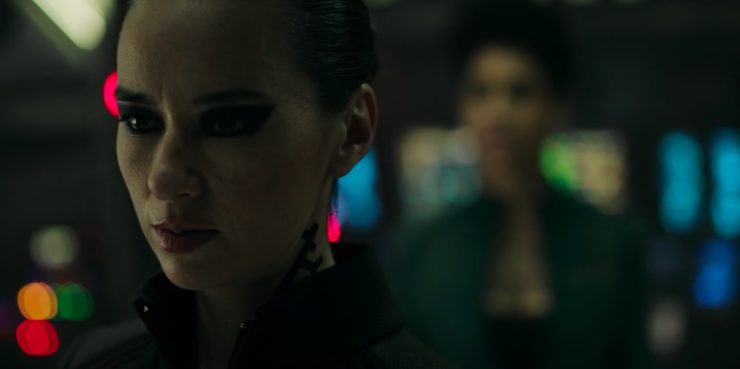
There’s a little moment in this episode that makes sense from all sides and shows this precisely: when Nico Sanjrani ducks out of the security line to taunt Drummer about being the Inners’ favorite pet. Sanjrani’s anger is justified; Belter anger about Inner oppression is always justified. Sanjrani is the administrator of an Inner station that’s being kicked back and forth between opposing forces like a soccer ball. Of course they’re pissed. But Drummer is considering a huge change that might be good for everyone, even as it goes against what Belters have resisted for so long. It’s probably a good change. But it’s hard to accept when anger has been fuel for decades.
You could say that story is change. It’s movement and growth and characters experiencing things. But not every SFF show is this good at remembering, and gracefully reminding us, how the past influences everything in the present, and how previous seasons have shaped the protagonists. There’s nothing Easter eggy or clever about Prax, Anna, and now Okoye appearing this season; they’re part of the story, and it would be weird if they didn’t show up, given their connections and skills. And every time we see one of them, it’s a reminder: of the horrible protomolecule hybrid; of that time the ring station almost killed everyone; of what happened on Ilus. Everything matters—something that episode (and book) writers Ty Franck and Daniel Abraham probably know better than anyone.
All that change and all that history bubble up in little moments of change and resistance, like Holden telling Monica he will never, ever agree to another interview. His distrust is valid, but he doesn’t necessarily know the work she’s been doing now, or that she gave Pastor Anna a way to speak to the whole system. However Monica has changed, Holden isn’t able to see it. (I like how this contrasts with their hug in the “One Ship” short. I think Holden likes Monica. He just doesn’t want to be her subject matter.)
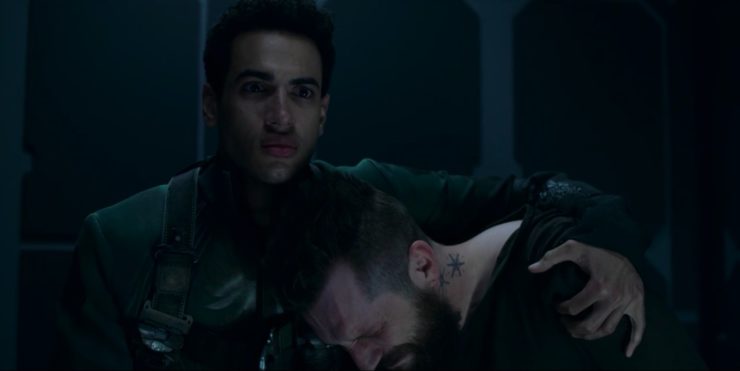
Marco is not going to be able to see how—and why—Filip has changed. It took me a minute to understand the role Tadeo plays in this story, but it’s simple: He shows Filip what family love can be. The most important thing he says to Filip is so quick you could easily miss it. When Filip asks why he’d do something so foolish as break radio silence, he says, “I wasn’t thinking of myself.”
I wasn’t thinking of myself. These are words that Marco Inaros would never say. And Marco has spent so long poisoning Filip against Naomi that her son can’t possibly see the ways in which Naomi’s actions were about and for him. But this is someone outside Filip’s family, and therefore maybe someone he can learn from. When he takes it upon himself to find out what happened to Tadeo’s brother, and then takes that news to Tadeo, and then holds his friend while he cries? That’s a different Filip. And it’s both a lesson in what family can look like, and that you can’t get everything you need from family.
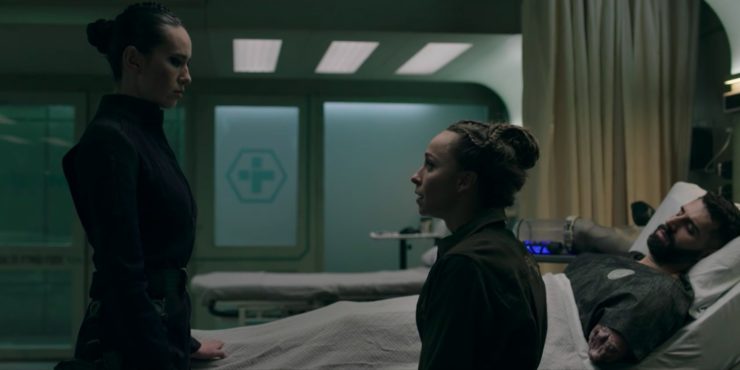
Change is what breaks Drummer’s family apart, but here, I think, is one place where everyone understands each other. That doesn’t make it any easier, but the love among these three is real. It’s there in the way Josep tears up, the way Michio is honest and clear, and the way Drummer reveals herself: “I never loved you because you were fighters,” she says. “I loved you because you were builders. I wanted us to build something together.”
When has Drummer ever spoken about what she, personally, wants? Not what she wants for the Belt or for her people, but herself? She has to walk away from what she wanted, and to some degree she blames herself; she tells Naomi that Michio and Josep left so they could stop paying for decisions she had made. (The framing in that bedside scene is so graceful—just the little bit of extra space between Drummer and her family. She’s always held herself back a little, but now they’re stepping back, making a change she will have to live with.)
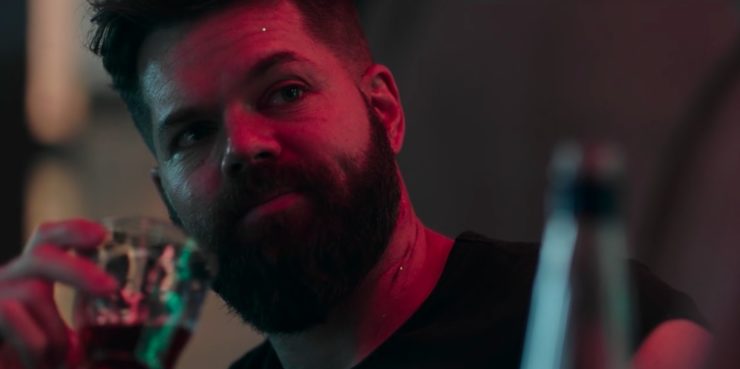
The MCRN won’t change, and throw themselves into a fight they have no chance of winning. (To be fair, they didn’t know the ring station had a shiny new rail gun until it shot at them.) Avasarala’s generals are stuck in their ways and want to do more of the same. Bobbie, though, has changed a little bit, and it shows in her tipsy bar talk with an even drunker Amos. (Glitter! Glittery Amos! What a glorious sight.) She’s still got her soldier tendencies, her soldier background, but it’s been tempered by everything she’s seen and done. The nationalistic qualities are gone. She tells Amos:
“In the end the only thing that matters is fighting for who’s covering your flank. Doesn’t matter if they’re saints or assholes. They’re your people and they watch your back and you watch theirs, or you’ve got nothing.”
It’s exactly what Amos needs to hear to push him back to the Rocinante, and not off into some other future. But it’s not everything. It’s not the only thing that matters, and Franck and Abraham spend the rest of the episode letting the non-fighters get their moments, too. Some of those moments are subtle or simple, like Holden making his (correct, but idealistic) case that the ring gates are a bigger issue than the war. He wants to save everyone from something even bigger than ourselves, and for once he’s talking to someone about this instead of flying off half-cocked and making a giant mess.
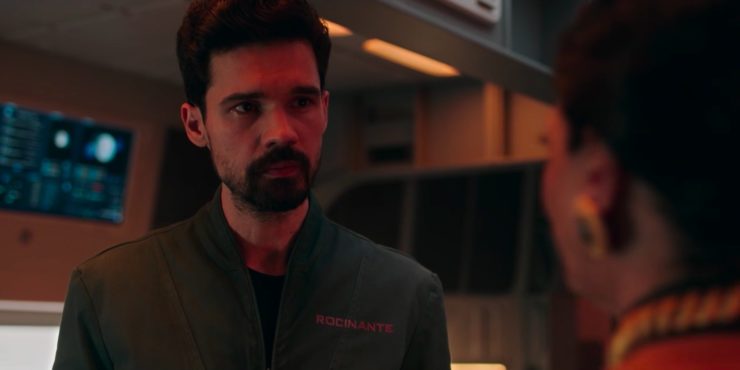
And sometimes they’re heartfelt and yet simple and full of grace. In many ways, this episode puts the fate of the system in the hands of three women: Avasarala, Drummer, and Naomi Nagata, whose role as go-between is less flashy but still vital.
Avasarala is the one who reminds us who she used to be: a woman who tortured a Belter because she could. She’s honest about who she was, and even she has some uncertainty about who she is now (“Was I trying too hard to be good when I should have been ruthless?” she asks Bobbie). But it’s a lot to ask of the Belt: not just to trust her, but to accept that she’s changed. We can see it in everything from her demeanor to her outfits (now in darker colors, ones that nod to the jumpsuits Belters wear). But her soldiers are still acting like Earther bullies and Ceres would still be suffering if Drummer hadn’t shown up to help. Demonstrating change can be as hard as accepting it.
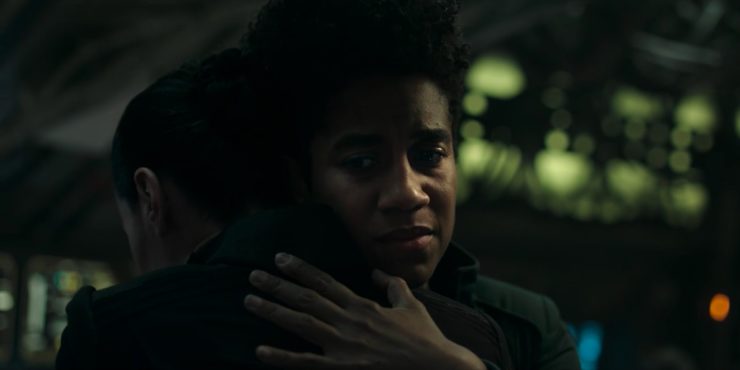
It’s the scene with Drummer and Naomi where so much of The Expanse—this season, this show—crystallizes. Naomi is a Belter who flies with an Earther captain; Drummer is a mutinous former member of the Free Navy who has worked under the most powerful men in the Belt and yet is arguably doing more for her people on her own, with a bounty on her head. She’s just lost the last of her family, and here comes Naomi Nagata, for whom Drummer risked so much, asking her to fight alongside Earth. In the wake of losing the last of her family, Drummer sees a terrible choice: be hunted or be tamed.
Building is change. Drummer wanted to build something. She still does, I think, and working with Avasarala is a compromise, and one she comes to because of what Naomi says: that all they can do is stand by the people they love. It’s a mirror image to Bobbie’s words. The former marine is focused on fighting; Naomi, who’s made so many choices about when to go and when to stay, is talking about love and loyalty and support. It’s all the same. It’s just different ways to say it.
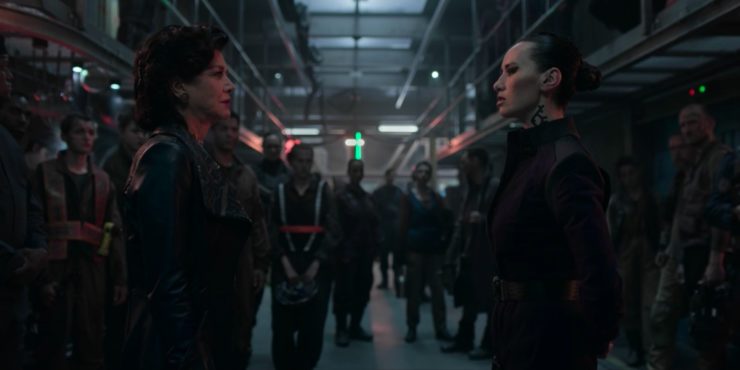
The episode’s grand finale—the women of earth and space meeting on the dock of Ceres Station, an Earther station that spins in the Belt—is shot with appropriate drama and acted to perfection. Drummer and Avasarala are both crisp and blunt and elegant in their own ways (and you just have to notice that Avasarala is finally wearing black, like Drummer usually does—while Camina is in a very deep, very regal purple). Belters will fight with Earthers against another Belter.
What this looks like, to me, nods to something Clarissa said last season, after Amos told her his theory about tribes. He said that when things are going well, people can exist in larger groups, but when things go south those groups get smaller and smaller. Later, Clarissa talks to Amos’s friend Erich about her interpretation of this: that maybe the way to make things better is to make the tribes bigger again.
Buy the Book


Sisters of the Forsaken Stars
That’s what Drummer and Avasarala are doing: making the tribe bigger again. Which ties straight in to Holden’s (correct) fear that the ring gate problem is bigger than the war. To deal with whatever’s eating ships, they’ll need to work together. And they’re somehow going to do all of that in one final episode? It’s a tall order.
FLOTSAM AND JETSAM
- The Laconia plot has gone where it was clearly going, and I feel even more like these scenes serve as a preview of something we may never get to see, which is to say, the Laconia arc from the last three books. It’s such a tease, too, for those of us who knowswhere Cara and Xan’s story goes! But I’m very curious what they’ll fit into the finale, and how it might connect.
- The opening sequence with the MCRN ships at the ring? I love being dropped into a fight and having that moment where I have to orient myself to figure out what’s happening. It’s quick and dirty and over so fast that it manages to be exactly as shocking as it needs to be.
- Drummer saying “fuck you” over and over when she finally breaks down, phew, can someone please give Cara Gee a whole pile of awards for her entire performance over all of these seasons? She knocks even the tiniest scene straight out of the park. Or the system.
- Drummer and Naomi’s scene plays a little differently if you’ve been watching the “One Ship” shorts that Amazon releases with each episode. Mostly they don’t have a huge effect on the main episodes, but that one adds even more weight to Naomi’s presence on Camina’s ship.
- I appreciate that Amos asks Bobbie if she wants to come with and I appreciate that the show doesn’t answer Bobbie’s question and I’m also incredibly relieved that she stayed at the bar because just let them be very tough space friends! Please! Forever! (Also the way she just laughs when he tells her about Holden disarming the torpedo. This was exactly the right moment to tell her the truth.)
- I barely talked about Marco but I would like to raise a toast to Kathleen Robertson for the way she carefully eyes Marco every time she walks up to him; you can see Rosenfeld debating how she’ll approach her boss each time, and what she’ll show him—and how she can use his many moods to her advantage.
- Worth noting that there are a lot of reasons “why we fight” in this episode—but Marco doesn’t get one.
Molly Templeton lives and writes in Oregon, and spends as much time as possible in the woods. You can also find her on Twitter.










